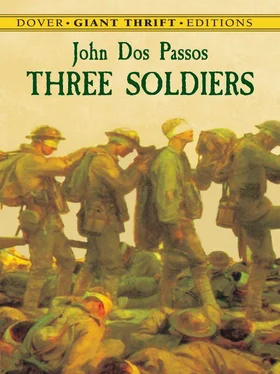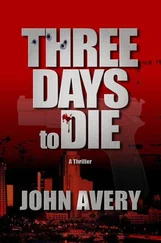“We’ll see,” said Andrews, as he opened the door to the bar.
He went up excitedly to the Chink, who sat behind the row of bottles along the bar.
“Well, what’s happening?”
“Where?”
“By the Gare de l’Est, where they were putting up barricades?”
“Barricades!” shouted a young man in a red sash who was drinking at a table. “Why, they tore down some of the iron guards round the trees, if you call that barricades. But they’re cowards. Whenever the cops charge they run. They’re dirty cowards.”
“D’you think anythin’s going to happen?”
“What can happen when you’ve got nothing but a bunch of dirty cowards?”
“What d’you think about it?” said Andrews, turning to the Chink.
The Chink shook his head without answering. Andrews went out.
When he came back he found Al and Chrisfield alone in their room. Chrisfield was walking up and down, biting his finger nails. On the wall opposite the window was a square of sunshine reflected from the opposite wall of the Court. “For God’s sake beat it, Chris. I’m all right,” Al was saying in a weak, whining voice, his face twisted up by pain.
“What’s the matter?” cried Andrews, putting down a large bundle.
“Slippery’s seen a M.P. nosin’ around in front of the gin mill.”
“Good God!”
“They’ve beat it… The trouble is Al’s too sick… Honest to gawd, Ah’ll stay with you, Al.”
“No. If you know somewhere to go, beat it, Chris. I’ll stay here with Al and talk French to the M.P.’s if they come. We’ll fool ’em somehow.” Andrews felt suddenly amused and joyous.
“Honest to gawd, Andy, Ah’d stay if it warn’t that that sergeant knows,” said Chrisfield in a jerky voice.
“Beat it, Chris. There may be no time to waste.”
“So long, Andy.” Chrisfield slipped out of the door.
“It’s funny, Al,” said Andrews, sitting on the edge of the bed and unwrapping the package of food, “I’m not a damn bit scared any more. I think I’m free of the army, Al… How’s your hand?”
“I dunno. Oh, how I wish I was in my old bunk at Coblentz. I warn’t made for buckin’ against the world this way… If we had old Dan with us… Funny that you know Dan… He’d have a million ideas for gettin’ out of this fix. But I’m glad he’s not here. He’d bawl me out so, for not havin’ made good. He’s a powerful ambitious kid, is Dan.”
“But it’s not the sort of thing a man can make good in, Al,” said Andrews slowly. They were silent. There was no sound in the courtyard, only very far away the clatter of a patrol of cavalry over cobblestones. The sky had become overcast and the room was very dark. The mouldy plaster peeling off the walls had streaks of green in it. The light from the courtyard had a greenish tinge that made their faces look pale and dead, like the faces of men that have long been shut up between damp prison walls.
“And Fuselli had a girl named Mabe,” said Andrews.
“Oh, she married a guy in the Naval Reserve. They had a grand wedding,” said Al.
“AT last I’ve got to you!”
John Andrews had caught sight of Geneviève on a bench at the end of the garden under an arbor of vines. Her hair flamed bright in a splotch of sun as she got to her feet. She held out both hands to him.
“How good-looking you are like that,” she cried.
He was conscious only of her hands in his hands and of her pale-brown eyes and of the bright sun-splotches and the green shadows fluttering all about them.
“So you are out of prison,” she said, “and demobilized. How wonderful! Why didn’t you write? I have been very uneasy about you. How did you find me here?”
“Your mother said you were here.”
“And how do you like it, my Poissac?”
She made a wide gesture with her hand. They stood silent a moment, side by side, looking about them. In front of the arbor was a parterre of rounded box-bushes edging beds where disorderly roses hung in clusters of pink and purple and apricot-color. And beyond it a brilliant emerald lawn full of daisies sloped down to an old grey house with, at one end, a squat round tower that had an extinguisher-shaped roof. Beyond the house were tall, lush-green poplars, through which glittered patches of silver-grey river and of yellow sand banks. From somewhere came a drowsy scent of mown grass.
“How brown you are!” she said again. “I thought I had lost you… You might kiss me, Jean.”
The muscles of his arms tightened about her shoulders. Her hair flamed in his eyes. The wind that rustled through broad grape-leaves made a flutter of dancing light and shadow about them.
“How hot you are with the sun!” she said. “I love the smell of the sweat of your body. You must have run very hard, coming here.”
“Do you remember one night in the spring we walked home from Pelléas and Melisande? How I should have liked to have kissed you then, like this!” Andrews’s voice was strange, hoarse, as if he spoke with difficulty.
“There is the château très froid et très profound” she said with a little laugh.
“And your hair. ‘Je les tiens dans les doits, je les tiens dans la bouche… Toute ta chevelure, toute ta chevelure, Mélisande, est tombée de la tour… ’ D’you remember?”
“How wonderful you are.”
They sat side by side on the stone bench without touching each other.
“It’s silly,” burst out Andrews excitedly. “We should have faith in our own selves. We can’t live a little rag of romance without dragging in literature. We are drugged with literature so that we can never live at all, of ourselves.”
“Jean, how did you come down here? Have you been demobilized long?”
“I walked almost all the way from Paris. You see, I am very dirty.”
“How wonderful! But I’ll be quiet. You must tell me everything from the moment you left me in Chartres.”
“I’ll tell you about Chartres later,” said Andrews gruffly. “It has been superb, one of the biggest weeks in my life, walking all day under the sun, with the road like a white ribbon in the sun over the hills and along river banks, where there were yellow irises blooming, and through woods full of blackbirds, and with the dust in a little white cloud round my feet, and all the time walking towards you, walking towards you.”
“And la Reine de Saba, how is it coming?”
“I don’t know. It’s a long time since I thought of it… You have been here long?”
“Hardly a week. But what are you going to do?”
“I have a room overlooking the river in a house owned by a very fat woman with a very red face and a tuft of hair on her chin… ”
“Madame Boncour.”
“Of course. You must know everybody… It’s so small.”
“And you’re going to stay here a long time?”
“Almost forever, and work, and talk to you; may I use your piano now and then?”
“How wonderful!”
Geneviève Rod jumped to her feet. Then she stood looking at him, leaning against one of the twisted stems of the vines, so that the broad leaves fluttered about her face. A white cloud, bright as silver, covered the sun, so that the hairy young leaves and the wind-blown grass of the lawn took on a silvery sheen. Two white butterflies fluttered for a second about the arbor.
“You must always dress like that,” she said after a while.
Andrews laughed.
“A little cleaner, I hope,” he said. “But there can’t be much change. I have no other clothes and ridiculously little money.”
“Who cares for money?” cried Geneviève. Andrew fancied he detected a slight affectation in her tone, but he drove the idea from his mind immediately.
“I wonder if there is a farm round here where I could get work.”
Читать дальше












